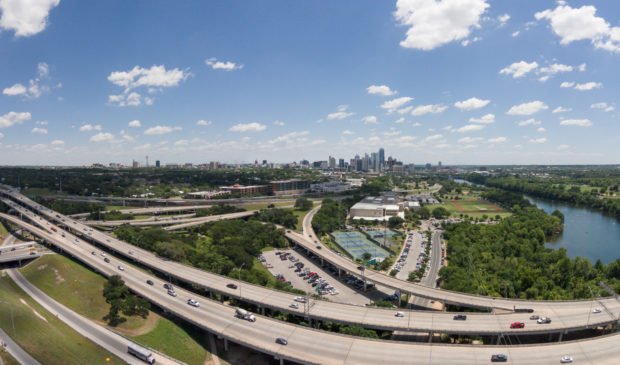County considers asking CAMPO for delayed Regional Transportation Plan adoption
Thursday, April 2, 2020 by
Ryan Thornton Plummeting oil prices and sales tax revenue have prompted the Travis County Transportation and Natural Resources Department to request a delay in the scheduled adoption of the 2045 Regional Transportation Plan.
Scheleen Walker, long-range planning manager with the department, says a delay of a few months will allow time for markets to stabilize and give the Capital Area Metropolitan Planning Organization a clearer picture of what it can expect from sales and oil production taxes, two of the state’s primary sources of transportation funds.
The CAMPO board is scheduled to update its 25-year regional plan in May, but Walker said the consequences of a delay will not be severe. Per Federal Highway Administration regulations, projects included in the region’s Transportation Improvement Program would still be allowed to proceed through 2022. The only penalty is that no projects could be added or otherwise amended until adoption of a regional plan.
“It’s difficult to get to a fiscally constrained plan when we don’t know what our fiscal capacities are,” said County Judge Sarah Eckhardt.
The “fiscally constrained” regional plan relies on projections of future revenue sources to shape and prioritize projects. As a result of Covid-19, Walker said markets are currently changing too fast to make those necessary predictions.
With the price of oil at its lowest point in decades, Commissioner Gerald Daugherty said the delay makes perfect sense, but the commissioner wanted to run the idea by CAMPO Chair Cynthia Long to avoid creating any conflict among CAMPO board members.
In consideration of Long’s recent efforts to get the central segment of Interstate 35 added to the state’s Unified Transportation Program, Daugherty said he wanted to make sure the request would not be interpreted as opposition to the proposed state or regional plans.
Eckhardt agreed to personally reach out to Long this week in order to clarify the intent of the delay before bringing the request back to the court next week for a vote. As for CAMPO staff, Walker said Executive Director Ashby Johnson expressed serious concern at a meeting Monday about the pandemic’s impact on future transportation projects.
On March 16, citing a “near collapse in the oil markets” and threat of recession, Robert Nichols and Terry Canales, respective chairs of the Senate and House Committees on Transportation, sent Texas Transportation Commission Chair Bruce Bugg a letter requesting a similar delay in adoption of the 2020 Unified Transportation Program.
“Simply put, the 10-year (Unified Transportation Program) is based on estimated revenues over a 10-year time period and since these estimates were last made, there have been substantial changes that have not yet stabilized,” the committee chairs explained.
The Texas Transportation Commission is scheduled to vote on the program on April 7.
Since Texas voters approved Proposition 1 in 2014, revenue from oil and natural gas production taxes has added $7.1 billion to the State Highway Fund. In Fiscal Year 2018-19 alone, over $4 billion was added to the same fund under Proposition 7, allocated from sales tax and motor vehicle sales and rentals.
Beyond the economic instability, Walker said the coronavirus has overwhelmed both local governments and the public during the 2045 plan public engagement process, leading to errors, unintentional omissions and confusing language in the online document and survey materials. The department suggests that CAMPO take advantage of the requested delay to revise and complete the public documents and restart the public engagement process.
One lesson to consider going forward, Commissioner Brigid Shea said, is “how effectively telecommuting has solved all of our transportation problems.”
“Granted, this is extreme telecommuting, but I really think we need to begin conversations with the downtown businesses, the governments – of which we’re a big contributor at the county – and others who have large numbers of employees driving into the narrow funnel of access to downtown all at the same time every morning and every evening.”
Shea said a robust phased telecommuting strategy could be a great solution for the county when the Stay Home, Work Safe order is lifted “so that not everybody has to be stupidly stuck in their car.”
Photo made available through a Creative Commons license.
The Austin Monitor’s work is made possible by donations from the community. Though our reporting covers donors from time to time, we are careful to keep business and editorial efforts separate while maintaining transparency. A complete list of donors is available here, and our code of ethics is explained here.
You're a community leader
And we’re honored you look to us for serious, in-depth news. You know a strong community needs local and dedicated watchdog reporting. We’re here for you and that won’t change. Now will you take the powerful next step and support our nonprofit news organization?










